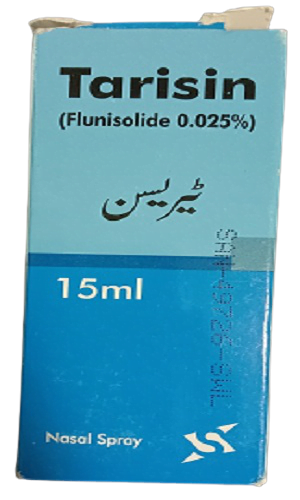TARISIN
Tarisin (Flunisolide 0.025%) is a Nasal spray that has a local anti-inflammatory effect within the upper respiratory tract. It is indicated for the treatment of sneezing, runny, stuffy, or itchy nose caused by hay fever or other allergies.
The medicine is manufactured by Sante (Pvt) Limited http://www.sante.com.pk
and is available online at https://dvago.pk
Presentation:
The package contains a 15ml bottle with a Nasal Spray Pump device which delivers 32 mcg of Flunisolide per actuation via a nozzle that is inserted into the nostrils.
Composition:
Each ml of Tarisin Nasal Spray contains
Flunisolide U.S.P 0.25mg
Dosage:
Adults: Usual initial dose is 1-2 sprays in each nostril two times daily.
Children: 5-12 years: One spray in each nostril two times a day.
The medicine is not recommended to children under the age of 5 years.
Storage:
·Store below 30°C.
· Protect from direct sunlight, heat, and moisture.
Keep out of the reach of the children.
·Wipe off the nozzle after use and replace the transparent cap.
Contra-Indications
The medicine is not recommended:
· With other corticosteroids untreated fungal, bacterial, or viral nasal infections.
· When someone has hypersensitivity to any of its components.
· During pregnancy.
Side-Effects and Precautions
Corticosteroids may mask the symptoms of infection and a new infection may appear during their use.
Tarisin Nasal spray may cause nasal burning and stinging which is transient in nature.
Some other side-effects are:
· Headache
· Vertigo
· Runny and stuffy nose
· Sore throat
· Hoarseness
· Throat irritation
If severe, these may require the discontinuation of therapy.
Absorption, sufficient to produce systemic effects, must be considered a possibility with prolonged excessive usage.
By: Hamna Ghufran


